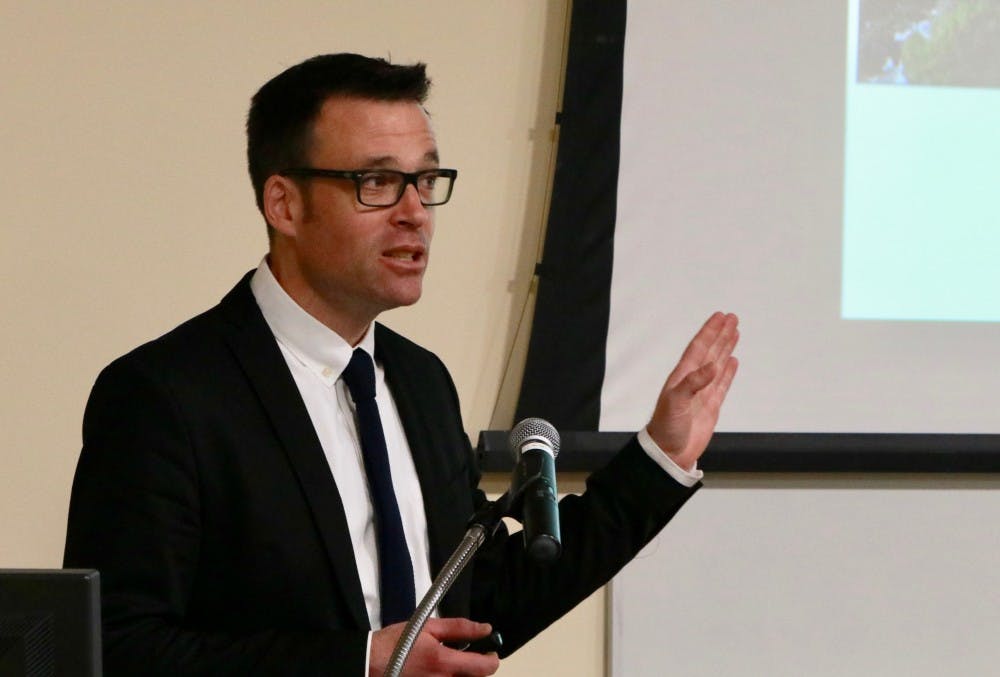At the University of Portland, many people value conversations about diverse religions and fostering interfaith talks. An event on Wednesday night sought to do just that, and guests packed Franz 120, making organizers add another row of chairs and have people stand on the margins of the room, to hear a talk on Islam and Catholicism in the modern world from Gabriel Said Reynolds.
Reynolds, a professor of Islamic studies and theology at the University of Notre Dame, spoke to a crowd of about 90 people on Wednesday for an event co-sponsored by the Garaventa Center and the Notre Dame Club of Portland. The talk focused on the relationship between Islam and the Catholic Church and how they can work together to combat religious extremism.
Reynolds outlined three tasks for the Church to counter extremist groups such as ISIS. He said the Church needs to continue to advocate for freedom of religion as a human right, as Reynolds said it has done under Pope Francis, to understand the role it has to defend Muslims in the Western world, and to realize both faiths’ emphasis on mercy. To explain the importance of these three considerations, Reynolds highlighted Islamic beliefs in general, outlined the similarities between Christianity and Islam and also where they differ.
He explained that Islam has a unique relationship with Christianity. Faiths such as Hinduism or Buddhism can choose to engage Jesus or not because he doesn’t have a role in them, Reynolds said. But in Islam, he’s a prophet and has a place in that faith’s narrative.
“For Islam, Jesus is central. And there’s a fundamental which claim Muslims make about Jesus, mainly that Christians have misunderstood Jesus and his message, and Mohammed was given revelation by God to correct those misunderstandings,” Reynolds said. “There might be something parallel with the way that Christians read the Hebrew scriptures.”
He went on to explain that Jesus performs miracles in the Qur’an as he does in the Bible and that there’s a whole chapter in the Qur’an dedicated to the Virgin Mary.
“There are other passages that seem to identify Mary and Jesus as special miracles, probably connected to the virgin birth,” Reynolds said. “But Mary is also listed as a model for all women, so there’s great veneration for Mary.”
Christians and Muslims also worship the same God, Reynolds explained, due to the similar roles and qualities they think God has.

“The Catholic Church...has been pretty clear that Muslims and Christians do worship the same God because there’s so much in common with our teaching of God as one creator, judge, sanctifier, so there are many aspects of theological teaching which are common,” Reynolds said.
The talk also touched on some differences between Islam and Christianity, including how they should emulate the respective figures at the cores of the faith, the faiths’ differing perspectives on Jesus’ crucifixion and the authoritativeness of the Bible.
Reynolds explained that while Christians may ask “What would Jesus do?” as a guiding question in moral decisions, Muslims would go a step further and ask not just what Mohammed would do but also questions like, “What he would eat and wear?” so that they could act like him in every aspect of their lives. He explained that this way of thinking aligns with the idea that Islam is a belief system that encompasses every aspect of people’s lives.
“
Jesus’ crucifixion also doesn’t hold the same meaning for Muslims, Reynolds noted. The Qur’an seems to reject it, but it’s also ambiguous and doesn’t comment on the significance of the event.
“Muslims do read the Bible, but sort of in a doctrinal way, the Bible is not considered to be authentic scripture,” Reynolds said. “In fact, many Muslims hold that it’s been falsified, so it doesn’t reflect the pure teaching of Moses or of Jesus.”
Reynolds also outlined the origins of ISIS and the challenges it presents both Christianity and Islam. He explained that ISIS justifies its worldview from a branch of Islam called Salafism that seeks to recreate the state established in the very early days of Islam. Within Salafism, there are various spheres, some of which are radical and some of which are not. He then gave his recommendations for the Church on countering ISIS and similar groups.
Audience members said they were excited to have learned more about Islam and engage in an interfaith dialogue.
“I came because I am very interested in interreligious dialogue,” David Turnbloom, UP theology professor, said. “It’s very important to learn about those who we aren’t as familiar with, and Islam is something I know a little bit about, but it’s nice to have experts on these other religions invited to our campus to have these dialogues.”
“I learned a lot about the similarities and the differences between Christian and Islamic views on God and how they’re very similar but then they’re also very different and how they conflict and also complement each other,” freshman Natasha Ma said.
At the end of the talk, Reynolds took questions. But one audience member, a UP alum, instead of asking a question, thanked him.
“As a Muslim who lived in Oregon for forty-five years, I thank you very much for talking about the conception (about) Muslims. I appreciate that.”








